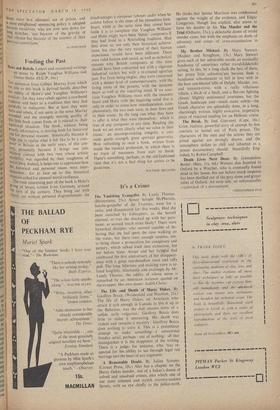Finding the Past
Heirs and Rebels. Letters and occasional writings on music by Ralph Vaughan Williams and Gustav Hoist. (O.U.P., I6s.)
dl!
t s if rite in
eft
icra .00 ific re'
THE quotation from Gilbert Murray from which the title to this book is derived hardly describes the oddity of Hoist's and Vaughan Williams's .Position: for they were rebels against a moribund tradition and heirs to a tradition that they had Painfully to rediscover. But at least they were heirs and rebels, if not quite, in the sense Murray intended: and the strangely moving quality of 'this little book conies from, or is related to. their equivocal situation. The book, without being exactly inforMative, is moving both for historical aridi for personal reasons: historically because it h el)' one to realise what it felt like to be a corn- Poser in Britain in the early years of this cen- tury: Personally because it brings one into Intinlale contact with two men whose artistic, sensibility was equalled by their toughness of the fibre. Indeed, it helps one to appreciate how ne historical and personal issues were inter-. di ePendent : for to face up to this historical situation called for unusual moral resilience. The most interesting part of the book is Hoist's g,r4)tiP of letters written from Germany around 'ne turn of the century. They bring out with vigour, yet without personal disgruntleMent. the disadvantages'a composer labours under when he cannot follow in the steps of his immediate fore- bears; while at the same time they reveal how fUtile it is to complain that Vaughan Williams and Hoist might have been 'better' composers if they had lived in a flourishing tradition. Had they done so, not only their historical achieve- ment, but also the very nature of their human experience, would have been different. There were valid human and social, as well as technical, reasons why British composers at this time should have been concerned not with a vigorous industrial society but with a re-created agrarian past. Far from being elegiac. they were concerned with a deeper level of contemporaneity. with the living roots of the present, with the innocent heart as well as the inquiring mind. If we asso- ciate Vaughan Williams more with the innocent heart and Hoist with the inquiring mind that is only in order to stress how interdependent. com- plementary, the two men were, in their lives and in their music. In the long run what they have to offer is what they were themselves: which is true of any composer at any time. Reading this book we see more clearly what we value in their music: an uncompromising integrity, a curi- ously gentle strength. great spiritual generosity.. How refreshing to read a book, written from inside the musical profession, in which there is no trace of meanness from start to finish. There's something, perhaps, in the old-fashioned view that it's not a bad thing for artists to be good men.
V‘'ILFRID MELLERS


































 Previous page
Previous page